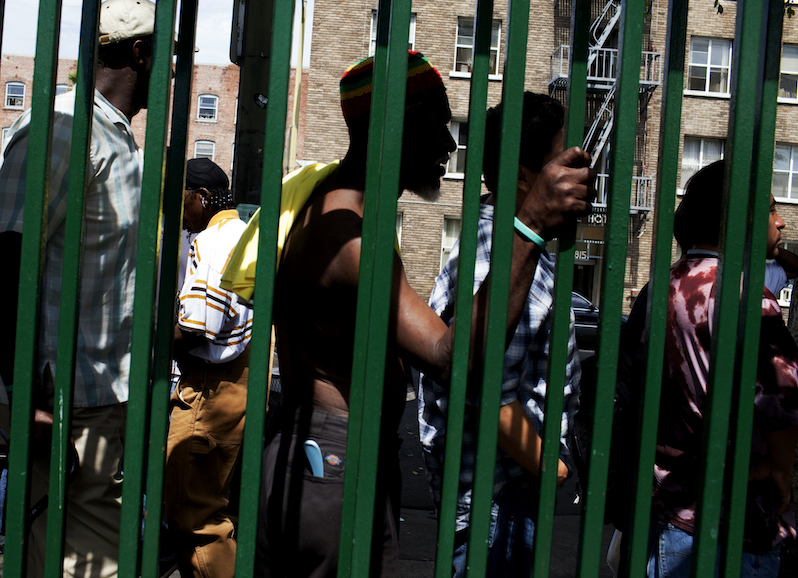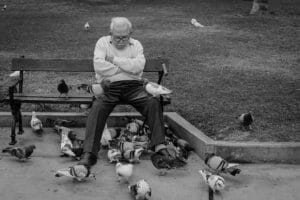Lock Up the Men, Evict the Women and Children
Part of the daily reality of poverty in America, evictions—along with mass incarceration—are the mechanisms used to destroy communities and profit from the misery of the poor. People wait in line for a free lunch outside Gladys Park in Los Angeles, a neighborhood with the nation's densest concentration of homeless people. (Philip Scott Andrews / AP)
1
2
3
People wait in line for a free lunch outside Gladys Park in Los Angeles, a neighborhood with the nation's densest concentration of homeless people. (Philip Scott Andrews / AP)
1
2
3
“The public peace—the sidewalks and street peace—of cities not is not kept primarily by the police, necessary as the police are,” wrote Jane Jacobs in “The Death and Life of Great American Cities.” “It is kept primarily by an intricate, almost unconscious, network of voluntary controls and standards among the people themselves, and enforced by the people themselves.”
Desmond, who follows the plight of eight families in impoverished neighborhoods in Milwaukee, registered the citywide devastation of constant evictions.
“A single eviction could destabilize multiple city blocks, not only the block from which a family was evicted but also the block to which it begrudgingly relocated,” he wrote. “In this way, displacement contributed directly to what Jacobs called ‘perpetual slums,’ churning environments with high rates of turnover and even higher rates of resentment and disinvestment.”
“The key link in a perpetual slum is that too many people move out of it too fast—and in the meantime dream of getting out,” Jacobs observed.
There is a lot of money to be made off the poor. They are defenseless. And the law is on the side of the predators. As Desmond noted in his book, in “many housing courts around the country 90 percent of landlords are represented by attorneys, and 90 percent of tenants are not.” Slumlords, who usually own numerous properties, use the courts and sheriffs as their enforcers. “Most tenants taken to eviction court were sued twice—once for the property and a second time for the debt—and so had two court dates,” Desmond wrote. And as long as the debt goes unpaid, the slumlord can slap on a 12 percent interest rate.
“For the chronically and desperately poor whose credit was already wrecked, a docketed judgment was just another shove deeper into the pit,” Desmond wrote. “But for the tenant who went on to land a decent job or marry and then take another tentative step forward, applying for student loans or purchasing a first home—for that tenant, it was a real barrier on the already difficult road to self-reliance and security.”
Corporations such as Rent Recovery Service are hired by landlords to hound evicted tenants for their debts. These corporations monitor tenants’ financial lives for years without their knowledge. They never close an unpaid file, waiting patiently for someone to become financially solvent to strike. Those few who begin to recover financially are forced to pay ancient debts, swelled by high interest rates, and pushed swiftly back into economic distress.
Desmond profiled Tobin Charney, who made close to half a million a year running College Mobile Home Park, with its dilapidated 131 trailers and leaking raw sewage. Charney seized the trailers of those he evicted as “abandoned property” and rented or sold them to someone else. Larraine Jenkins, one of his tenants Desmond followed, was paying Charney 77 percent of her income until she was evicted.
“She knew the ghetto’s value and how money could be made from a property that looked worthless to people who didn’t know any better,” Desmond wrote of a slumlord named Sherrena Tarver, who made about $10,000 a month from her dozens of rental properties. She earned more in a month than most of her tenants earned in a year. And like many slumlords, “her worst properties yielded her biggest returns.”
A life of dead ends led many in Desmond’s book to make decisions that, on the outside, could be seen as irresponsible or foolish: withholding rent payments, or as Larraine Jenkins did, blowing her monthly allocation of food stamps on a dinner of lobster tails, shrimp, crab, lemon meringue pie and Pepsi. But the present is unbearable, and the future, they know, is grim. So they block the future out and seek, for a moment, to make the present endurable. It is why so many of the poor turn to drugs or alcohol. Jenkins, as Desmond wrote, was not “poor because she threw money away.” She “threw money away because she was poor.”
“People like Larraine [Jenkins] lived with so many compounded limitations that it was difficult to imagine the amount of good behavior or self-control that would allow them to lift themselves out of poverty,” Desmond wrote. “The distance between grinding poverty and even stable poverty could be so vast that those on the bottom had little hope of climbing out even if they pinched every penny. So they choose not to. Instead, they tried to survive in color, to season the suffering with pleasure. They would get a little high or have a drink or do a bit of gambling or acquire a television. They might buy lobster on food stamps.”
The powerlessness of poverty evokes a protective emotional callousness that diminishes or blunts the capacity for empathy and feelings of self-worth. Arleen Belle, who battles depression and lives on welfare, struggles to raise a teenage boy, Jori, and his 5-year-old brother, Jafaris, who has severe asthma. The book opens with Jori and his cousin throwing snowballs at cars on Milwaukee’s South Side. An angry driver stops his vehicle, chases the boys to their apartment and kicks down the front door. The family is evicted because of the incident and moves to a homeless shelter. They had lived in the apartment for eight months. Jori was forced to change schools five times in the seventh and eighth grades because of repeated moves. Later in the book, after Jori kicks a teacher in the shin, the police show up at the door and the family, which had just moved into the apartment after a lengthy and exhausting search, is given a week to leave. The string of evictions and length of the waiting list—3,500 names—means Belle and her boys will never receive housing assistance. Three-quarters of families that qualify for housing assistance nationally never obtain it.
Your support matters…
SUPPORT TRUTHDIG
Independent journalism is under threat and overshadowed by heavily funded mainstream media.
You can help level the playing field. Become a member.
Your tax-deductible contribution keeps us digging beneath the headlines to give you thought-provoking, investigative reporting and analysis that unearths what's really happening- without compromise.
Give today to support our courageous, independent journalists.




You need to be a supporter to comment.
There are currently no responses to this article.
Be the first to respond.